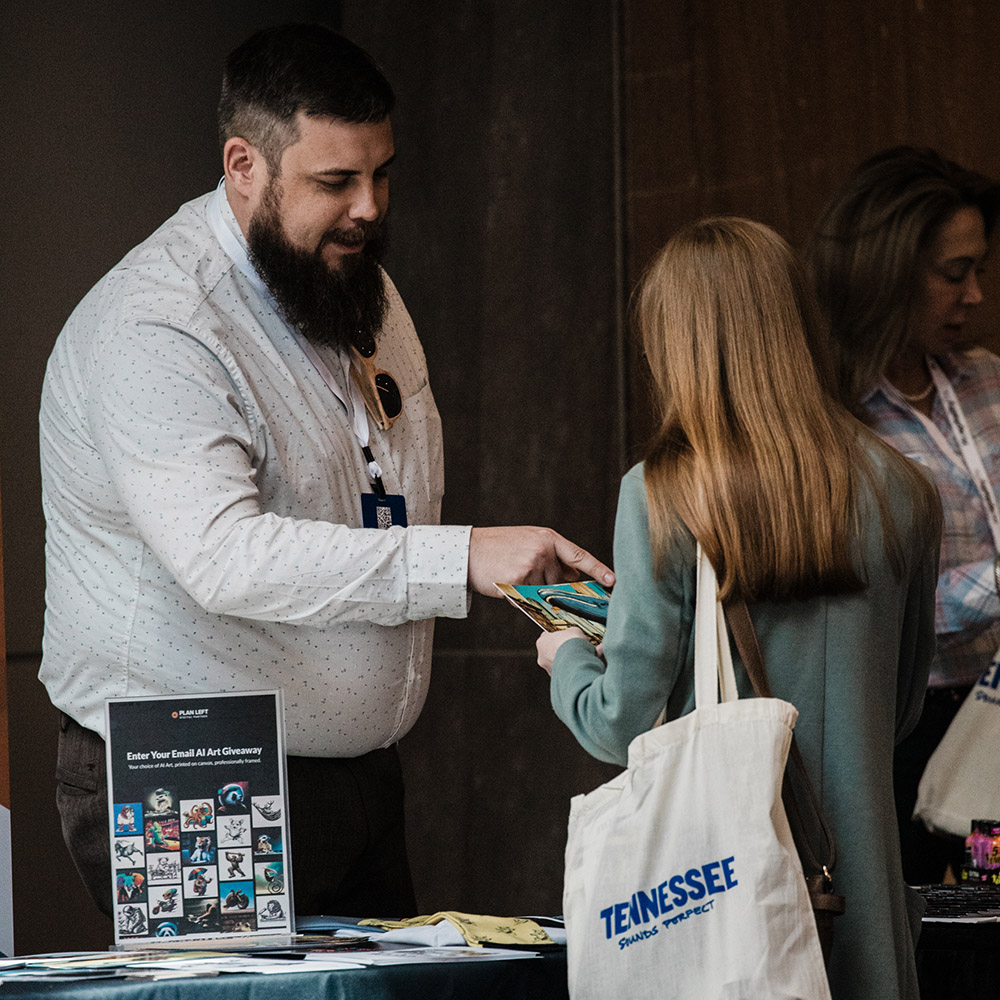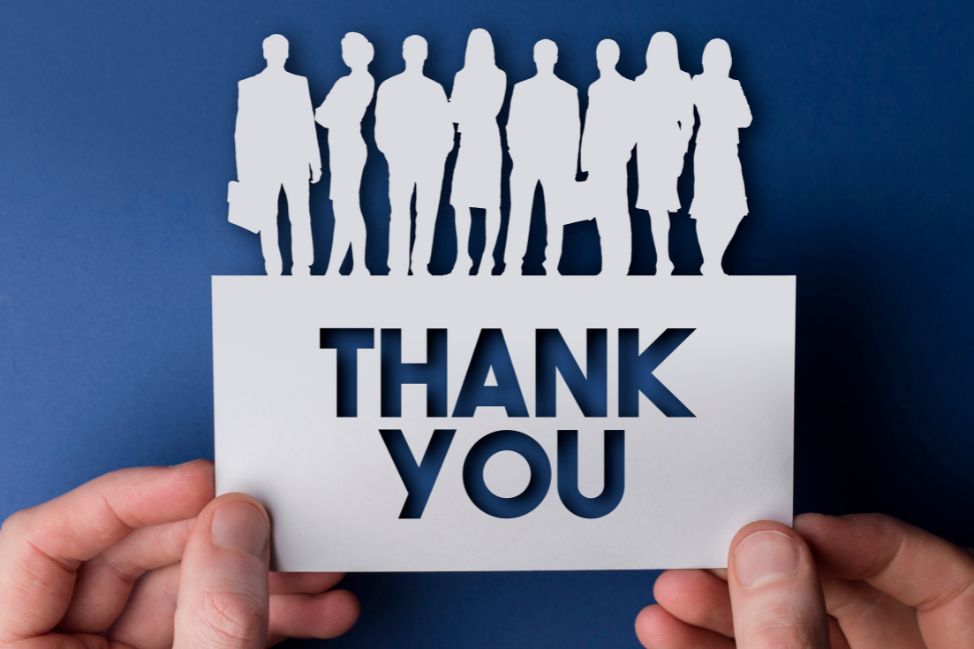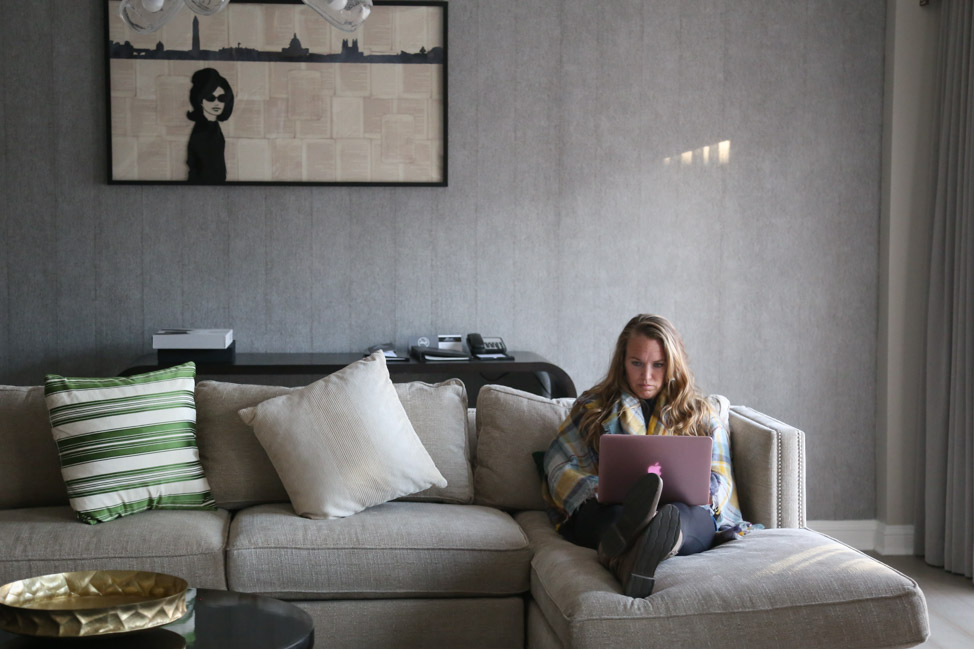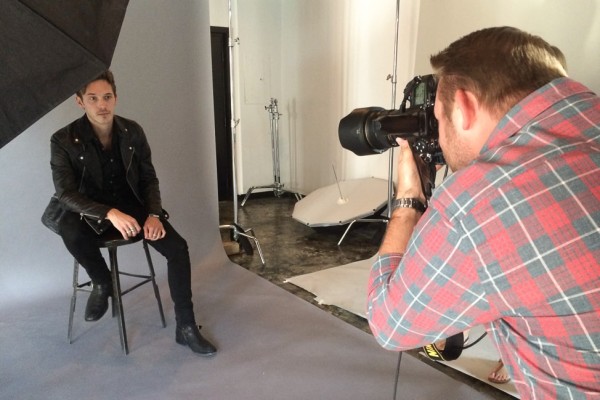I’ve been on a speaker loop this past month—presenting to Governor’s Conference, college classes and community organizations about a bevy of topics from marketing to placemaking—and one recurring questions I’ve been asked is “what are your best tips on networking?”
And hey, it’s a valid question. In an era of tech overload that’s oversaturated with new meaningless social media platforms that seem to crop up by the day, it can be tricky to crack the networking nut and figure out exactly how to get someone’s attention, not to mention make genuine connections. So I’m spilling the tea—as a journalist, a marketer and someone who lives my life online, here’s how I prefer to network and be networked.
Contact me by email, please
My email address is pretty much everywhere you look. It’s there for a reason. If you want to connect or get my attention, do it via email first. Even if I don’t respond right away—which, often, I’ll get non-pressing emails from students or aspiring journalists, bookmark them, and respond at a later date when I have the time—you can rest assured that’s the best way for me to see what it is you’re wanting to tell me.
Related Post: This is How You Write a Professional Email
Don’t have our initial outreach be via social media
See point one: My email is everywhere. Unless you’re reaching out to say, “hey, I just wanted to know I love what you had to say about ABC, and I’m sending you an email to inquire about XYZ,” I’d prefer you email me and not Instagram/Facebook/LinkedIn DM if it’s work-related.
Why is that, you ask? It’s simply for my own organizational sanity. I get so many Facebook messages from people who want to book photo sessions (which is great! I love a new client!); however, I often see them during my 2am insomnia hours, quickly to be forgotten about by the time I wake the next day, and there’s no great way to organize and label read messages on any social media platform.
Meanwhile, my email is a very carefully orchestrated series of labels and stars and color-coding, so you can rest assured if you have a business inquiry or just a question in general, I will see it at some point very soon if you send it by email.
Don’t contact on day one of following
Look, people can see when you followed them on social media. Very little is more irritating then someone saying they’ve “followed you forever” in that initial email, only to get a notification that I was followed by that person on that very day. Do your research just like you would for any job; follow the person you’re wanting to connect with on LinkedIn and/or any other social media platforms where they’re active, learn what it is they have to teach and share, and only then connect.

Never cold-call unless we’re on a regular email or texting basis
One of my top networking tips, especially to the Boomer generation and others who are used to picking up a phone and calling someone, is realizing that voice calls are very generation-specific—and also a bit of a hot topic at the moment. Personally, if you call me without a head’s up, I’m going to assume 1) someone died or 2) someone died. That’s one way to get my attention, I suppose, but not in the way you probably hoped.
There’s also the fact that if you’re reaching out for the first time and somehow managed to track down my number, you’ll go right to voicemail. I have my iPhone filters in place not to accept calls from anyone outside of my contacts to combat a serious influx of robocallers and spam. So if you want to reach me and you feel like your query merits a phone call, either fire off an email or text (if we’re on that level) saying, “do you have time to hop on the phone and talk about [X topic]? if so, let me know when is convenient for you;” that’s the way you’re most likely to get a Millennial or Gen Zer on the phone.
As a journalist, I actually don’t mind phone calls in moderation—if I know they’re coming, and if they’re limited to take into consideration everyone’s time and schedule. What I don’t like is an unsolicited call when I’m likely in the middle of a writing deadline, a photo shoot or an interview with a source, which is why a head’s up via email or text is always a good idea.
Related Post: How to Say “No:” Every Entrepreneur’s Plight
It’s OK to follow-up … but give it time
I get it, tech mishaps happen. Recently, I missed an important business email that hit my spam filter, so I was doubly-grateful the contact followed up after 10 days and said, “hey, I would love to get this started when you have a chance to review.” I got back to her immediately as it was a project we are super stoked for and was so glad she followed up since I had missed the initial email.
Follow-up protocol: Wait at least a week if the issue is not pressing. If it’s something for which you’re on deadline, it’s OK to follow up within 48 hours or so with a subject line that says “time sensitive” or notes your deadline and a message to the effect, “I just wanted to make sure this didn’t slip through the cracks. I’d love to work with you on [X project], and my deadline is [Y].” Keep it short and to the point.
When this is not OK? Press releases. PR people, the age of the press release is dead. There’s no need to follow-up about a hotel deal in Cherry Blossom Valley, Wisconsin to make sure I saw it. Please stop cluttering journalists’ inboxes with non-relevant information, and/or offer a way to unsubscribe to any press release distribution list you may send out.
Related Post: What It Costs to Run a Blog or Media Business
Have a specific ask
I speak to a lot of high school and college classes. I always leave my email behind, and I’m happy when they take me up on the offer to reach out. But they’re much more likely to get a quick response if they send questions that I can answer directly—like, “if I want to intern for a magazine in New York City, where is a good place to go for internships?” or “I’m interested in a career in tourism. What would you suggest as a good first step while I’m still in college?”
What’s incredibly hard is vague, sweeping or open-ended questions, particularly to answer via email as opposed to in person (e.g. when I’m presenting at a conference), like “what it’s like working in journalism?” or “how did you first start traveling?” That’s a very long-winded story that spanned a decade and not one easily answered via a quick email. When I get questions like that, I tend to flag them for another day or send a blog post link in response. I’m much more likely to get back to an unsolicited email if there are specific questions I can answer quickly in my downtime (while waiting at the airport, in a doctor’s office, etc.).

But don’t over-ask
While I’m always eager to help others within my own time constraints and bandwidth, what I don’t have time for is coffee dates—or a phone call from someone wanting to pick my brain. That borders on consulting territory (which I do a lot of, as well!), so if you’re looking for that kind of coaching (from me, from anyone), your best plan of attack is to ask the person you’re seeking advice from if they offer consulting sessions via Zoom or in person. I can’t remember the last time I took a coffee date with someone I didn’t know unless it was for a specific purpose. I just don’t have the time as an entrepreneur with multiple businesses and a very busy travel schedule.
Related Post: Show Me the Money! How to Diversify Your Income as a Writer or Creative
Attend conferences and industry events
While I may not have time for one-off coffee dates, you know when I do love to meet people face-to-face? At conferences. So if you’re someone in an industry that hosts regular events—for tourism, that might be your state’s Governor’s Conference or any number of other annual media or marketing events—and use that opportunity to meet those in your field in person. Face-to-face connections will always beat digital ones, and conferences are also a great way to meet others on neutral ground (i.e. neither of your offices) in a more social environment.

Offer something in return when you can
If you’re asking a favor, it’s always nice to show that you’re willing to repay that favor. For example, a friend recently asked if I’d speak to his college classes, which I was happy to do, and while I would never expect anything in return, he very graciously offered his help with my nonprofit if ever I required his extensive expertise in social enterprise. That’s not something I would have asked of him had he not brought it up because I respect his time and role as a consultant, but it did not go unnoticed by me that he was generous to offer this as a kind of friend quid-pro-quo.
Related Post: Stop Working for Free: A Guide to Negotiating for Creatives
Show gratitude
I’m a big fan of thank you notes; I send them often as a way to show I’m thankful for someone’s help or action, and it’s always nice to be on the receiving end of this, as well. A podcast host I was recently interviewed by sent me a thank you note with stickers, and who doesn’t love unexpected happy mail? Those small gestures stick in people’s memories.
Saying thanks doesn’t have to be in the form of written mail either. A simple email or text thanking the person you’re seeking help from will suffice. But I guarantee that I remember the people who showed gratitude versus those who did not, and you know who I will go out of my way to help in the future if given the chance!

At the end of the day, networking is tricky and ever-changing, and it’s OK you slip and fall a few times as you learn the ins and outs. Also, different industries may have different quirks, so note that you may want to further delve into how people in your career path network and connect. This is simply my experience as someone who has worked in the media and tourism for 20 years.














I struggle so much with networking. So much of the time I feel like I end up being the super connector instead of doing any level of self-promotion. I go into networking almost more worried about how to be of service to the other person. Making networking more reciprocal is a huge goal of mine.
That is such a great point and one I’ve struggled with in the past: always being the connector and not the connectee. That said, in recent years, the tables have turned and I’ve had very lovely friends and clients who have gone out of their way to introduce or recommend me for projects, so I do think it all evens out in the end?